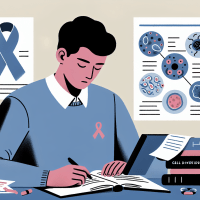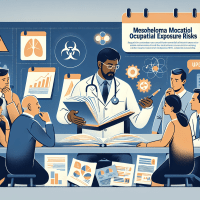Mesothelioma Symptoms vs Lung Cancer: A Compassionate Guide
Published: June 2024

Introduction: My Journey and Commitment to Oncology Patient Advocacy
As an experienced oncology patient educator and advocate, I understand firsthand the anxiety and uncertainty that accompanies a diagnosis related to thoracic cancers. In my many years of working closely with patients and caregivers, I have witnessed the profound impact that detailed, reliable information can have on clinical decision-making and personal wellbeing. In this post, I offer my personal insights on understanding and distinguishing between mesothelioma and lung cancer, particularly focusing on their symptoms, treatment options, and overall prognoses. I strive to provide clarity and comfort by blending expert insights with compassionate support.
This guide is rooted in a factual, empathetic approach, drawing on current data from authoritative sources such as the National Cancer Institute (NCI), American Cancer Society, and the Mesothelioma Applied Research Foundation. I recognize the emotional burden and the need for well-structured information when facing critical health decisions, and I am here to support you on this journey.
Understanding Mesothelioma and Lung Cancer: A Comparative Overview
Mesothelioma and lung cancer are distinct conditions, each with unique causes, symptoms, and treatment pathways. While both involve the respiratory system and share overlapping symptoms, the origins and progression of each disease are notably different. In my discussions with patients, I have learned that a deeper understanding of these nuances not only fosters better treatment outcomes but also empowers patients to take control of their health journey.
Mesothelioma: An Overview
Mesothelioma is a rare, aggressive cancer that affects the mesothelium, a protective lining covering many internal organs, especially the lungs and abdomen. The primary risk factor for mesothelioma is prolonged exposure to asbestos, a group of minerals formerly widely used in industrial applications. Though mesothelioma accounts for a small percentage of all cancers, its diagnosis carries significant emotional and physical challenges. As I have observed, early symptoms can be subtle, including chest pain, persistent cough, and shortness of breath.
Lung Cancer: Broad Spectrum and Diverse Origins
Lung cancer, in contrast, can develop from a variety of factors, notably tobacco use, environmental pollutants, and even genetic predispositions. Its symptoms often mimic benign respiratory conditions—ranging from chronic cough, hoarseness, and recurrent respiratory infections—to more severe presentations such as marked weight loss and persistent chest discomfort. Distinguishing early signs of mesothelioma vs lung cancer is critical as early diagnosis can affect survival rates, something I have discussed extensively when counseling patients.
Comparing the Symptoms: Mesothelioma vs Lung Cancer
It is essential for patients and caregivers to be aware of the nuanced differences between the symptoms of mesothelioma and lung cancer. While overlapping symptoms can create confusion, a careful evaluation of symptom onset, duration, and associated risk factors can guide further diagnostic testing. Here, I outline the key differences based on clinical observations and research data:
- Mesothelioma Symptoms: Often includes a gradual onset of chest pain, difficulty breathing, and persistent cough. These symptoms are usually linked to prior asbestos exposure. Patients may also report abnormal fluid buildup around the lungs (pleural effusion), causing further complications.
- Lung Cancer Symptoms: These can include a new or changing cough, blood in the sputum, chest pain, and lung infections such as bronchitis. While smoking is the most common risk factor, environmental pollutants and genetic factors are also significant.
For those wondering about the differences between mesothelioma and lung cancer symptoms, it’s critical to remember that while both diseases share similar respiratory symptoms, the patient’s history—especially asbestos exposure—can serve as an important diagnostic clue. Research highlights that early and accurate differentiation can help in choosing appropriate mesothelioma treatment options or targeted lung cancer therapies.
Staging and Treatment Approaches
Accurate staging in both mesothelioma and lung cancer is essential to develop an effective treatment plan. The stage of a cancer typically determines the prognosis and often guides clinical decisions. I always emphasize to my patients that understanding the stage of their disease empowers them to have informed conversations with their healthcare teams.
Mesothelioma Staging and Treatment
Mesothelioma is typically staged from I to IV, with Stage I indicating localized disease and Stage IV representing more advanced spread. The treatment strategy may include surgery, chemotherapy, and radiation therapy, either as stand-alone treatments or as part of a multimodal approach. I once worked with a patient who, with careful management and timely intervention, was able to pursue a treatment plan that balanced aggressive therapy with quality-of-life considerations.
Lung Cancer Staging and Intervention
Lung cancer staging also depends on the extent of tumor spread, and treatment modalities may range from surgical resection to targeted therapies and immunotherapies. An important aspect that I discuss is the mesothelioma vs lung cancer survival rates, which, while generally more favorable in early-stage lung cancer, can be challenging to interpret without comprehensive diagnostic workups.
Below is a medically accurate diagram illustrating mesothelioma staging and treatment options. This visual aid provides a clear, step-by-step overview of how staging influences clinical decisions. It is crucial that such visuals are interpreted by a professional for clarity and applicability to individual cases.

Exploring Treatment Options and Internal Resources
In addressing both mesothelioma and lung cancer, it is vital to explore all available treatments. Advances in oncology have led to significant developments in both surgical interventions and systemic therapies. For example, patients facing asbestos-related lung conditions now have a broader range of asbestos-related lung cancer treatment options than ever before.
In my role, I focus on not only explaining the treatment nuances but also on the emotional journey that accompanies these choices. I often refer patients to additional resources available within our community to help them navigate the complexities of care. For further information on treatment specifics, please visit our detailed page on Mesothelioma Treatment Options.
Equally important is the emotional and mental support that patients and caregivers need. The process of being diagnosed and treated for either cancer can be overwhelming. As part of my dedication to holistic care, I encourage reading our comprehensive guide on Emotional Support Resources for Mesothelioma Caregivers to find comfort and community.
Navigating Diagnosis: Key Considerations for Early Detection
Early detection plays a crucial role in improving outcomes for both mesothelioma and lung cancer. The subtle differences in initial symptoms, such as the early signs of mesothelioma vs lung cancer, are essential for timely diagnosis. I always advise those who have experienced potential asbestos exposure or a persistent cough to discuss these concerns with their healthcare provider promptly.
Diagnostic procedures may include imaging tests like CT scans, MRIs, and biopsies. By understanding the purpose and outcome of these tests, patients can better appreciate the importance of early intervention. My approach has always been to demystify the process, thereby reducing anxiety and fostering a cooperative relationship between patient and provider. This is underscored by current guidelines from both the American Cancer Society and the NCI, which stress timely medical evaluation for individuals at risk.
A Transparent View on Our Support and Resources
I want to be completely transparent: while this site is dedicated to providing thorough, unbiased information and support to the mesothelioma community, some external links or references might occasionally include commercial services related to legal and treatment consultations. However, please rest assured that these are clearly identified and come only after I have provided full informational support. My primary goal is to educate and empower, and every piece of advice is tailored with utmost empathy and commitment to your well-being.
Reflecting on Prognosis and Ongoing Research
The question of prognosis is something I frequently address with patients. Comparing mesothelioma and lung cancer prognosis requires a careful look at various factors including staging, overall health, and available treatment options. While statistics may provide a general outlook, each patient’s journey is unique. Through continual involvement in the latest research and clinical trials, I remain committed to offering the most current insights and support. It is my sincere hope that, armed with knowledge and supported by a compassionate community, you feel empowered to actively participate in your care decisions.
Continued research is vital. I often encourage patients and caregivers to seek out the most updated studies and recommendations from reputable organizations. The pace of scientific discovery is rapid, and staying informed is one of the best strategies for confronting these challenging diagnoses. I remain dedicated to bridging the gap between complex medical data and everyday compassion, ensuring that the information you receive is not only accurate but also genuinely helpful in your care journey.
Conclusion: Empowerment Through Knowledge and Compassion
In conclusion, differentiating between mesothelioma and lung cancer symptoms is a critical step in securing a timely and targeted treatment plan. The subtle distinctions, particularly when weighed against the backdrop of one’s medical history, are invaluable in navigating the often overwhelming world of cancer diagnosis and treatment. As someone who has supported countless patients in their journey, I can affirm that informed decision-making is a powerful tool against fear and uncertainty.
This article aims to serve as a beacon of guidance, merging scientific understanding with heartfelt care. Whether you or a loved one is facing these diagnoses, remember that you are not alone. The information provided here, based on the latest research and my personal experiences, is meant to empower you to seek the care and support you deserve.
Thank you for taking the time to read this comprehensive guide. I hope it provides clarity, reassurance, and actionable insights for anyone impacted by mesothelioma or lung cancer.






